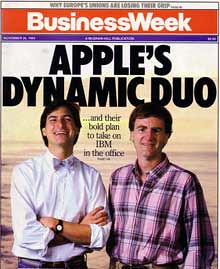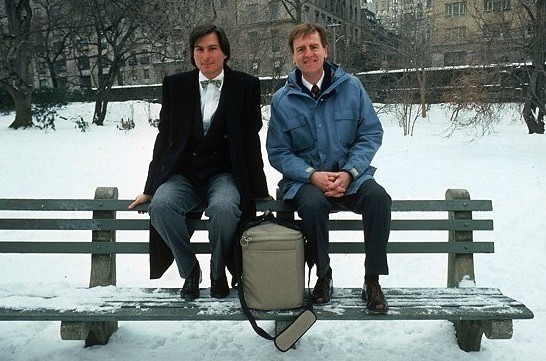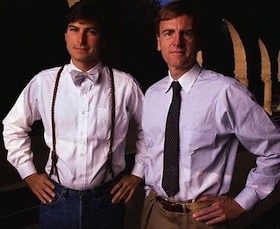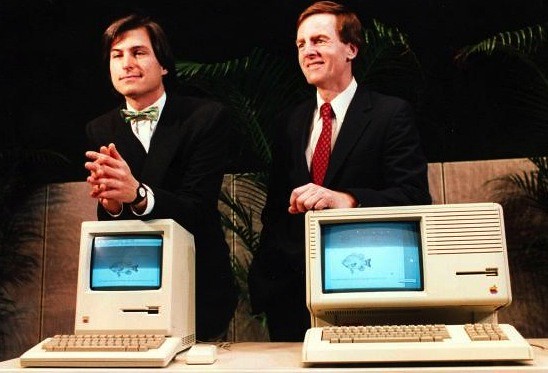“Do you want to sell sugar water for the rest of your life, or do you want to change the world?”
 So said a young Steve Jobs to Pepsi CEO John Sculley in 1983 in an effort to convince the then cola executive to take on CEO duties at Apple. At the time, Sculley was highly a praised marketing executive who who helped craft the Pepsi Challenge, an ad campaign which helped Pepsi steal a sizable amount of marketshare away from Coke.
So said a young Steve Jobs to Pepsi CEO John Sculley in 1983 in an effort to convince the then cola executive to take on CEO duties at Apple. At the time, Sculley was highly a praised marketing executive who who helped craft the Pepsi Challenge, an ad campaign which helped Pepsi steal a sizable amount of marketshare away from Coke.
Sculley eventually acquiesced to Jobs’ charm and made his way over to Apple in April 1983 as the company’s CEO. Working together, Sculley would focus on marketing while Jobs would preoccupy his time with the tech side of things – and for a short while, things went according to plan.
Mac sales plummet, tension builds
The honeymoon between Jobs and Sculley, however, didn’t last long as the two would soon clash on a number of heated issues, chief among declining Mac sales. Despite the groundbreaking technological advances of the Mac, sales of Apple’s revolutionary product simply weren’t living up to expectations. While early sales of the Mac were impressive, sales soon began trending downward as 1984 marched on. Illustrating just how dire the situation had become, Apple’s marketing team anticipated sales of 75,000 Macs per month during the 1984 holiday shopping season – in reality, Apple at the time was struggling to sell 20,000 units per month.
With Mac hardware gathering dust on store shelves, it was only a matter of time before people started pointing fingers. Sculley naturally blamed Jobs for dwindling Mac sales while Jobs maintained that Sculley was doing a piss poor job of managing company resources.

Above: Jobs and Sculley in Central Park circa 1984 with the original Mac
Andy Hertzfeld, one of the original members of the Mac development team, recalls how the mixture of tension and pressure to perform affected Jobs’ ability to productively interact with some people inside the company.
Steve Jobs had never suffered fools gladly, and as the pressure mounted, he became even more difficult to work with. Employees from every part of the company began to approach John with complaints about Steve’s behavior, including some of Steve’s direct reports in the Macintosh Division. John felt especially strongly about building more compatibility bridges with the IBM PC, an approach which Steve disdained. John began to view Steve as an impediment toward fixing Apple’s problems, and the board of directors were urging him to do something about it.
With that as a backdrop, it didn’t take long for Sculley to grow weary of Jobs’ eccentricities and conclude that he was fast becoming more of liability than an asset. Sculley eventually confronted Jobs about his behavior and it’s effect on Mac development. Not being one open to criticism, Jobs reportedly tore into Sculley and blamed Apple’s woes on Sculley’s inefficient handling of marketing manners and non-Mac divisions like the Apple II.
When Apple posted its earnings report on March 11, 1985, the results were disappointing to say the least. Macintosh sales were down and revenues were only 10% of what Apple anticipated.
Sculley takes his case to the Board
One month later, in early April 1985, things came to a head when Sculley demanded that Apple’s board of directors remove Jobs from his position as Apple Vice President and General Manager of the Mac department. Sculley didn’t want to get rid of Jobs completely, but rather hoped that Jobs would take on more of a representative role within the company, albeit with no direct power or influence.
 From April 10 to April 11 1985, Apple’s board engaged in lengthy meetings where they unsuccessfully tried to convince Jobs to take on more of a product visionary position within the company. Jobs, not to be outdone, scoffed at the idea and instead lobbied the board to remove Sculley as Apple CEO..
From April 10 to April 11 1985, Apple’s board engaged in lengthy meetings where they unsuccessfully tried to convince Jobs to take on more of a product visionary position within the company. Jobs, not to be outdone, scoffed at the idea and instead lobbied the board to remove Sculley as Apple CEO..
The battle lines were drawn and Sculley ultimately issued the board an ultimatum – “I’m asking Steve to step down and you can back me on it and then I take responsibility for running the company, or we can do nothing and you’re going to find yourselves a new CEO.” After two days of intense back and forth, the board eventually sided with Sculley.
The transition to a power-less position for Jobs, however, didn’t happen immediately as Sculley hoped to convince Jobs that the position re-alignment would actually benefit both Jobs and Apple. Sculley’s optimism would quickly prove to be misguided as Jobs wasted no time in attempting to outmaneuver Sculley behind the scenes.
And now here’s where things get interesting.
Jobs attempts a coup
After receiving permission from the US State Department to sell Apple II’s to the Chinese government for use in educational institutions, Jobs was invited to take part in a signing ceremony in Beijing. Thinking two steps ahead, Jobs convinced Sculley to go in his stead, all the while planning a corporate coup while Sculley would be away. Jobs’ ultimate goal was to re-organize Apple into four different divisions and put Sculley in charge of Apple’s retail division – a more fitting position for a marketing man like Sculley, Jobs reasoned. Jobs, of course, would first have had to convince the Board, but his plan quickly unravelled and never got off the ground.
Looking to rouse up support among the troops, Jobs shared his plan with a number of Apple employees, including Jean-Louis Gassée, a stylish French manager at Apple who would later go on to found Be Inc., which Apple almost ended up acquiring in the late 90’s. Gasse eventually relayed Jobs’ scheme to Apple chief counsel Al Eisenstat who promptly told Sculley of Jobs’ plan.
When word of Jobs’ attempted power play eventually reached Sculley, he quickly cancelled his trip to China and immediately headed to Cupertino to deal with the issue head on.
At that point, there was no denying that Jobs simply had to go. Sculley wanted Jobs gone, and the board agreed. On May 31, 1985, Jobs was formally relieved of his positions as Apple VP and General Manager of the Mac department. Jobs had officially been stripped of all authority and was now solely an Apple chairman. The man who was the face of Apple now wielded now power at the company he co-founded 9 years earlier.

Jobs’ demotion and resignation
In the wake of his new demotion within Apple, Jobs sold 85,000 shares of Apple stock and because he had no real responsibilities, travelled to Europe and the Soviet Union where he helped market the Mac in Europe and promote the Apple II in Russia – interestingly, Apple at the time had permission to sell the Apple II in Russia, but was prohibited from selling the Mac.
By early September, Jobs had had enough of his diminished role and decided to leave Apple altogether with the intention of forming a new venture. He subsequently told Apple’s board that he was leaving Apple to start a new company and that he’d be taking a few key executives and engineers along with him.
A few days later, Jobs handed a resignation letter to longtime Apple employee Mike Markkula (employee #3 behind Jobs and Woz). Jobs also forwarded a copy of the letter to Newsweek, presumably to garner public support.
Dear Mike,
This morning’s papers carried suggestions that Apple is considering removing me as Chairman. I don’t know the source of these reports, but they are both misleading to the public and unfair to me.
You will recall that at last Thursday’s board meeting I stated that I had decided to start a new venture, and tendered my resignation as Chairman.
The board declined to accept my resignation and asked me to defer it for a week. I agreed to do so in light of the encouragement the Board offered with regard to the proposed new venture and the indications that Apple would invest in it. On Friday, after I told John Sculley who would be joining me, he confirmed Apple’s willingness to discuss areas of possible collaboration between Apple and my new venture.
Subsequently the Company appears to be adopting a hostile posture toward me and the new venture. Accordingly, I must insist upon the immediate acceptance of resignation. I would hope that in any statement it feels it must issue, the Company will make it clear the decision to resign as Chairman was mine.
I find myself both saddened and perplexed by the management’s conduct in this matter which seems to me contrary to Apple’s best interests. Those interests remain a matter of deep concern to me, both because of my past association with Apple and the substantial investment I retain in it.
I continue to hope that calmer voices within the Company may yet be heard. Some Company representatives have said they fear I will use proprietary Apple technology in my new venture. There is no basis for any such concern. If that concern is the real source of Apple’s hostility to the venture, I can allay it.
As you know, the company’s recent reorganization left me with no work to do and no access even to regular management reports. I am but 30 and want still to contribute and achieve.
After what we have accomplished together, I would wish our parting to be both amicable and dignified.
Yours sincerely,
Steven P. Jobs
In a separate letter, also addressed to Markkula, Jobs reiterated his desire to help create something great. “I’m only 30 years old,” Jobs wrote, “and I want to have a chance to continue creating things. I know I’ve got at least one more great computer in me. And Apple is not going to give me a chance to do that.”
The Aftermath
For many, Jobs’ departure was an unmitigated blow. Andy Hertzfeld recalled the drama years later while filming Triumph of the Nerds. “Apple never recovered from losing Steve,” Hertzfeld said, “Steve was the heart and soul and driving force. It would be quite a different place today. They lost their soul.”
Not everyone at Apple was in mourning, however. Former Apple engineer and executive Larry Tesler, who began working at Apple in 1980 and helped develop both the Lisa and the Macintosh, had this to say about Jobs’ departure.
People in the company had very mixed feelings about it. Everyone had been terrorized by Steve Jobs at some point or another and so there was a certain relief that the terrorist had gone but on the other hand I think there was an incredible respect for Steve Jobs by the very same people and we were all very worried — what would happen to this company without the visionary, without the founder without the charisma…
Following his departure from Apple, Jobs immersed himself in projects at both Pixar and NeXT. Still, the wounds suffered during his final months at Apple never seemed to heal for Jobs. While discussing the circumstances surrounding his unceremonious exit from Apple in Triumph of the Nerds, Jobs heaped all of the blame upon Sculley.
What can I say? I hired the wrong guy. [Sculley] destroyed everything I spent ten years working for. Starting with me but that wasn’t the saddest part. I would have gladly left Apple if Apple would have turned out like I wanted it to.
In a recent interview, Sculley noted that he and Jobs haven’t spoken in over 20 years and that he doesn’t expect that to change anytime soon. That notwithstanding, Sculley (who was ousted from Apple in 1993) still has a lot of respect for Jobs and the tremendous job he’s done in bringing Apple back from the brink of bankruptcy to one of the most innovative and profitable consumer electronics companies in the world. “Even though he still doesn’t speak to me, and I expect he never will, I have tremendous admiration for him,” Sculley said.
Looking back, Sculley theorizes that things might have worked out differently had the company spent more time trying to better determine more appropriate roles for Jobs and himself.
“My sense is that it probably would never have broken down between Steve and me if we had figured out different roles,” Sculley explains. “Maybe he should have been the CEO and I should have been the president. It should have been worked out ahead of time, and that’s one of those things you look to a really good board to do.”
Interestingly, Sculley also expresses regret that he didn’t try and bring Jobs back into the Apple fold when he himself was ousted from Apple in 1993.
“I wish I had gone back and gotten hold of Steve and said, ‘Hey, I want to go home. This is your company still. Let’s figure out a way for you to come back,’ ” Sculley said. “Why I didn’t think of that, I don’t know.”
With time, not to mention a battle with cancer and newfound success at Apple, Jobs was able to look back at his firing from Apple as a blessing in disguise.
Below is an excerpt from Jobs’ now legendary 2005 commencement speech at Stanford.
I didn’t see it then, but it turned out that getting fired from Apple was the best thing that could have ever happened to me. The heaviness of being successful was replaced by the lightness of being a beginner again, less sure about everything. It freed me to enter one of the most creative periods of my life.
During the next five years, I started a company named NeXT, another company named Pixar, and fell in love with an amazing woman who would become my wife. Pixar went on to create the worlds first computer animated feature film, Toy Story, and is now the most successful animation studio in the world. In a remarkable turn of events, Apple bought NeXT, I returned to Apple, and the technology we developed at NeXT is at the heart of Apple’s current renaissance…
I’m pretty sure none of this would have happened if I hadn’t been fired from Apple. It was awful tasting medicine, but I guess the patient needed it. Sometimes life hits you in the head with a brick. Don’t lose faith. I’m convinced that the only thing that kept me going was that I loved what I did.
Jobs’ entire 15 minute commencement speech is below and is well worth listening to.
Today, Sculley serves as the co-chairman of Watermark Medical, a privately owned medical technology company. And despite the friction Sculley and Jobs shared in the past, Sculley still remains a fan of Apple, and is especially enthusiastic about the iPad.
“I think the iPad is the most brilliant product that Steve has ever brought out,” Sculley said this past April. “It is completely consistent with everything that I learned from him when he was creating the first Macintosh and desktop publishing. That it starts with the user experience.”
Indeed.





November 24th, 2010 at 10:03 pm
cheap airmiles Seriously, you’re paying to much. Check out buying with miles.. ei